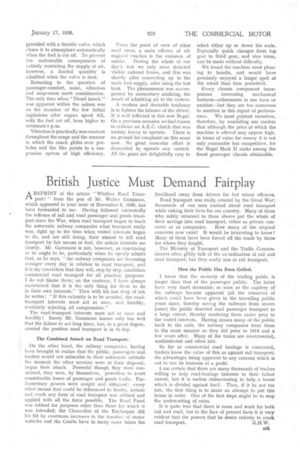British Justice Must Demand Fairplay
Page 45

If you've noticed an error in this article please click here to report it so we can fix it.
A REPRINT of the article "Whither Road Transf1 port?" from the pen of Mr. Walter Gammons, which appeared in your issue of November 8, 1935, has been forwarded to me. Having followed interestedly the reflexes of rail and road passenger and goods transport since the War, when road transport began to teach the autocratic railway companies what transport really was, right up to the time when vested interests began to do, and are still doing, their utmost to kill road transport by fair means or foul, the article interests me closely, Mr. Gammons is not, however, as convincing as he ought to be, particularly when he openly admits that, as he says, "the railway companies are becoming stronger every day in relation to road transport, and it is my conviction that they will, step by step, annihilate commercial road transport for all practical purposes. I do not blame them; on the contrary, I have always maintained that it is the only thing for them to do in their own interests." Then with his last drop of ink he writes : "If this calamity is to be avoided, the roadtransport interests must act at once, and forcibly, resolutely rejecting all compromises."
The road-transport interests must act at once and forcibly Surely Mr. Gammons knows only too well that the failure to act long since, has, to a great degree, created the position road transport is in to-day.
The Combined Attack on Road Transport.
On the other hand, the railway companies, having been brought to realize that the public, passengers and traders would not subscribe to their autocratic attitude the moment the other services were at their disposal, began their attack. Powerful though they were considered, they were, by themselves, powerless to avert considerable losses of passenger and goods traffic. Parliamentary powers were sought and obtained : every other means that could be influenced to hinder, irritate and crush any form of road transport was utilized and applied with all the force possible. The Road Fund was robbed for purposes other than those for which it was intended; the Chancellor of the Exchequer did his bit by enormous increases in the taxation of motor vehicles and the Courts have in many cases taken the
livelihood away from. drivers for but minor offences.
Road transport was really created by the Great War; thousands of our men learned about road transport while risking their lives for our country. Many of those who safely returned to these shores put the whole of their savings into road transport, either as private con cerns or as companies. How many of the original concerns now exist? It would be interesting to know Many of them have been forced off the roads by those for whom they fought.
The Ministry of Transport and the Traffic Commissioners often glibly talk of the co-ordination of rail and road transport; but they really aim at rail transport.
How the Public Has Been Gulled.
I know that the memory of the trading public is longer than that of the passenger public. The latter have very short memories; so soon as the cajolery of the railways became apparent (all the resources of which could have been given to the travelling public years since, thereby saving the railways from severe losses) the public deserted road passenger transport to a large extent, thereby rendering them easier prey to the vested interests. Having drawn many of the public back to the rails, the railway companies treat them in the same manner as they did prior to 1914 and a few years after. Many of .the trains are overcrowded,, undisinfected and often late.
So far as commercial road haulage is concerned,. traders know the value of this as against tail transport; the advantages being apparent to any concern which is out to run its business at a profit.
I am certain that there are many thousands of traders willing to help road-haulage interests to their fullest extent, but it is useless endeavouring to help a house which is divided against itself. Then, if it be not too late, the first thing is to make an attempt to put this house in order. One of the first steps might be to stop the undercutting of rates.
It is quite true that there is room and work for both rail and road, but in the face of present facts it is very evident that the powers that be desire entirely to crush road transport. G.H.W.




























































































